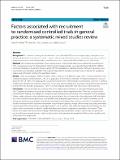Files in this item
Factors associated with recruitment to randomised controlled trials in general practice : a systematic mixed studies review
Item metadata
| dc.contributor.author | Moffat, Keith R. | |
| dc.contributor.author | Shi, Wen | |
| dc.contributor.author | Cannon, Paul | |
| dc.contributor.author | Sullivan, Frank | |
| dc.date.accessioned | 2023-02-07T16:30:07Z | |
| dc.date.available | 2023-02-07T16:30:07Z | |
| dc.date.issued | 2023-02-06 | |
| dc.identifier | 283279377 | |
| dc.identifier | 67841679-d675-4763-8080-778bf500d6ed | |
| dc.identifier | 85147460624 | |
| dc.identifier.citation | Moffat , K R , Shi , W , Cannon , P & Sullivan , F 2023 , ' Factors associated with recruitment to randomised controlled trials in general practice : a systematic mixed studies review ' , Trials , vol. 24 , 90 . https://doi.org/10.1186/s13063-022-06865-x | en |
| dc.identifier.issn | 1745-6215 | |
| dc.identifier.other | RIS: urn:0635373D793C82548DD56E86B87D795A | |
| dc.identifier.other | RIS: Moffat2023 | |
| dc.identifier.other | ORCID: /0000-0002-6623-4964/work/128568261 | |
| dc.identifier.uri | https://hdl.handle.net/10023/26915 | |
| dc.description | Funding: This review was undertaken with a PhD Stipend from the University of St Andrews. | en |
| dc.description.abstract | Background A common challenge for randomised controlled trials (RCTs) is recruiting enough participants to be adequately powered to answer the research question. Recruitment has been set as a priority research area in trials to improve recruitment and thereby reduce wasted resources in conducted trials that fail to recruit sufficiently. Methods We conducted a systematic mixed studies review to identify the factors associated with recruitment to RCTs in general practice. On September 8, 2020, English language studies were identified from MEDLINE, EMBASE, Cochrane Database of Systematic Reviews and CENTRAL databases for published studies. NTIS and OpenGrey were searched for grey literature, and BMC Trials was hand searched. A narrative synthesis was conducted for qualitative studies and a thematic synthesis for qualitative studies. Results Thirty-seven studies met the inclusion criteria. These were of different study types (10 cross-sectional, 5 non-randomised studies of interventions, 2 RCTs, 10 qualitative and 10 mixed methods). The highest proportion was conducted in the UK (48%). The study quality was generally poor with 24 (65%) studies having major concerns. A complex combination of patient, practitioner or practice factors, and patient, practitioner or practice recruitment were assessed to determine the possible associations. There were more studies of patients than of practices or practitioners. Conclusions For practitioners and patients alike, a trial that is clinically relevant is critical in influencing participation. Competing demands are given as an important reason for declining participation. There are concerns about randomisation relating to its impact on shared decision-making and not knowing which treatment will be assigned. Patients make decisions about whether they are a candidate for the trial even when they objectively fulfil the eligibility criteria. General practice processes, such as difficulties arranging appointments, can hinder recruitment, and a strong pre-existing doctor-patient relationship can improve recruitment. For clinicians, the wish to contribute to the research enterprise itself is seldom an important reason for participating, though clinicians reported being motivated to participate when the research could improve their clinical practice. One of the few experimental findings was that opportunistic recruitment resulted in significantly faster recruitment compared to systematic recruitment. These factors have clear implications for trial design. Methodologically, recruitment research of practices and practitioners should have increased priority. Higher quality studies of recruitment are required to find out what actually works rather than what might work. Trial registration PROSPERO CRD42018100695. Registered on 03 July 2018. | |
| dc.format.extent | 19 | |
| dc.format.extent | 1488361 | |
| dc.language.iso | eng | |
| dc.relation.ispartof | Trials | en |
| dc.subject | RA Public aspects of medicine | en |
| dc.subject | DAS | en |
| dc.subject | MCC | en |
| dc.subject.lcc | RA | en |
| dc.title | Factors associated with recruitment to randomised controlled trials in general practice : a systematic mixed studies review | en |
| dc.type | Journal item | en |
| dc.contributor.institution | University of St Andrews. Population and Behavioural Science Division | en |
| dc.contributor.institution | University of St Andrews. School of Medicine | en |
| dc.contributor.institution | University of St Andrews. Sir James Mackenzie Institute for Early Diagnosis | en |
| dc.identifier.doi | 10.1186/s13063-022-06865-x | |
| dc.description.status | Peer reviewed | en |
This item appears in the following Collection(s)
Items in the St Andrews Research Repository are protected by copyright, with all rights reserved, unless otherwise indicated.

